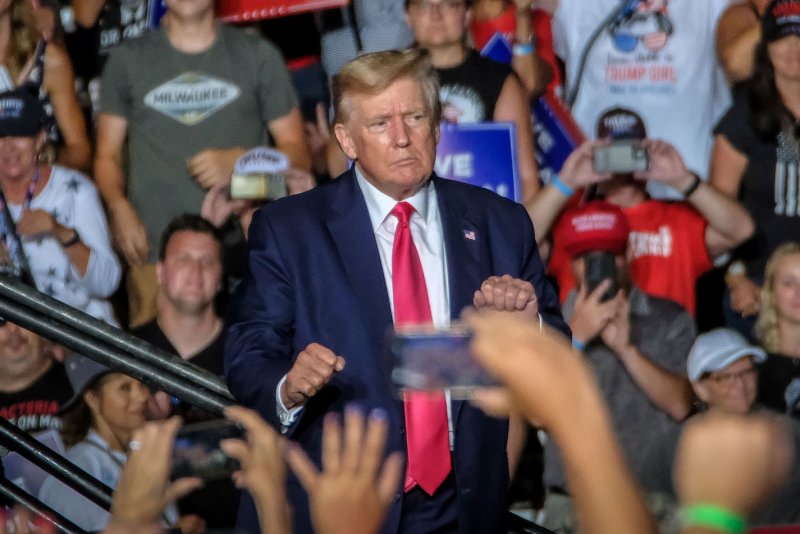1 of 4 | The legal team for former President Donald Trump argued in a court filing on Wednesday that the former president was entitled to the presidential records seized from his Florida Mar-a-Lago residence in early August. Photo by Alex Wroblewski/UPI |
License Photo
Aug. 31 (UPI) -- The lawyers for former President Donald Trump on Wednesday again called on the court to appoint an independent arbitrator to look over documents seized by the FBI from his Mar-a-Lago residence earlier this month, arguing against the legality of the search and in favor of the president possessing his own presidential records.
Trump's counsel filed the 19-page document in response to a Justice Department filing made the night previous in which federal lawyers argued against the third-party reviewer, known as a Special Master, on the grounds that the seized documents have already been reviewed, belong to the government and pose risks to U.S. national security interests.
The Department of Justice filing also accused Trump and his counsel of obstruction in the FBI's criminal investigation into the former president's handling of the classified records.
In the angrily written filing, Trump's lawyers accuse its federal counterparts of attempting to nix oversight to allow itself to "be entrusted with the responsibility of evaluating its unjustified pursuit of criminalizing a former President's possession of personal and Presidential records."
Despite the Presidential Records Act of 1978 establishing "public ownership of all Presidential records," Trump's counsel states the Justice Department's argument that the former president does not have executive privilege over the documents in question is a "convoluted theory" used to justify its "unprecedented, unnecessary and legally unsupported raid" of his home, they said.
His lawyers contend that the act does not contain an enforcement provision and only "exhorts" a former president to engage with the records archivists. Because of this, the search warrant was issued under the Espionage Act, which criminalizes the collection and retention of national defense and classified records.
Trump's legal team also states even if he illegally possessed items the seizure of them ignores precedent set in a 1963 Supreme Court ruling that establishes evidence of a crime seized in an illegal arrest or search cannot be used in court.
"To suggest that the seizure of allegedly 'illegally possessed' items negates standing literally distorts the entire concept of the Wong Sun 'fruit of the poisonous tree' doctrine into the bizarre notion that, if the recovered property is potentially illegal to possess, then the homeowner can never challenge the basis of the intrusion," Trump's counsel said.
In favor of appointing a Special Master, Trump's legal team contends one is necessary for various reasons, including fears the Justice Department will "impugn, leak and publicize" specifics of their investigation leaving Trump without recourse.
They also contend that the Privilege Review Team, which was tasked with reviewing the seized documents for potential attorney-client privileged material, was "wholly deficient" in identifying materials and stating where they were confiscated from.
The Wednesday filing is the latest development in litigation concerning the former president's retention of presidential records from his tenure in the White House, and which the U.S. National Archives and Records Administration has sought since last year.
In January amid discussions between NARA and Trump's legal team, 15 boxes of documents that were stored in Mar-a-Lago were handed over to the government, which found they contained classified national security records that were unfoldered, intermixed with other records and improperly identified, the department's Tuesday night filing said, adding some had been "torn up."
This prompted NARA to contact the FBI concerning the mishandling of presidential records.
A grand jury subpoena was then obtained for agents to seize any and all documents and containers that hold classified records from the Palm Beach resort, and in response, Trump's counsel in early June produced 38 classified documents, stating all such documents were kept in a storage room.
Trump's team in a sworn certification said that now all documents had been handed over following "a diligent search."
However, the FBI obtained evidence that this was not the case and applied for a search warrant for the Florida residence, which was executed Aug. 8.
The raid produced an additional 33 boxes, containers or items of evidence, including more than 100 classified records, some classified at the highest levels, and which was more than twice the quantity Trump's counsel had produced in June.
They also found three such documents in a desk in the president's office.
In the Tuesday night filing, the Justice Department accused Trump and his legal team of concealing and removing records and taking actions "to obstruct the government's investigation."
In their response on Wednesday, Trump's lawyers accused the Justice Department of having "significantly mischaracterized" the June 3 meeting at Mar-a-Lago between members of the former president's team and that of the Justice Department, stating that if that information was used to secure the affidavit in support of the search warrant "then they misled the Magistrate Judge" who authorized the raid.















